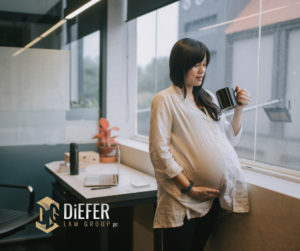 California employment law protects employees of businesses with five or more workers. Women have rights to reasonable accommodation related to mental and physical conditions during pregnancy or loss of pregnancy and childbirth. No form of discrimination against pregnant women is allowed. Under certain conditions, parental leave of up to 12 weeks is permitted within the first year after the child’s birth. This also applies to foster care placement and adoption.
California employment law protects employees of businesses with five or more workers. Women have rights to reasonable accommodation related to mental and physical conditions during pregnancy or loss of pregnancy and childbirth. No form of discrimination against pregnant women is allowed. Under certain conditions, parental leave of up to 12 weeks is permitted within the first year after the child’s birth. This also applies to foster care placement and adoption.
Anything related to pregnancy and childbirth that prevents a female employee from performing employment duties is regarded as a pregnancy disability. It includes duties that might risk the successful completion of the pregnancy. Examples include the following:
- pre and postnatal care
- severe morning sickness
- bed rest prescribed by a doctor
- hypertension
- gestational diabetes
- postpartum depression
- preeclampsia
- mastitis or another lactation-related condition
- recovery from the end or loss of the pregnancy
Under California law, women with pregnancy disabilities might have rights to the following accommodations and work environment changes:
- modifications to less strenuous work duties
- having a chair or stool available while working
- temporary transfer to less hazardous or strenuous duties
- more frequent or extended breaks
- accommodation for privacy during lactation
- pregnancy disability leave
The type of work and the circumstances of the pregnancy-related disability will play a role in the worker’s rights to accommodation, including the type of accommodation to which she is entitled. No employer may terminate the employment of a pregnant employee simply because the worker is pregnant. It is also illegal to discriminate against an employee for pregnancy-related conditions.







